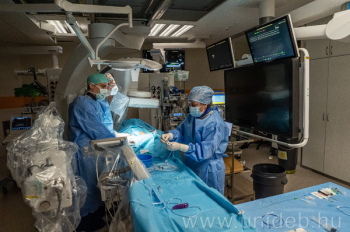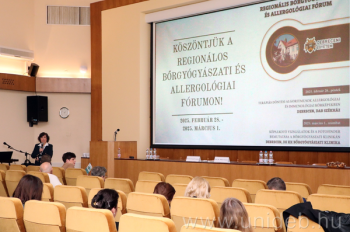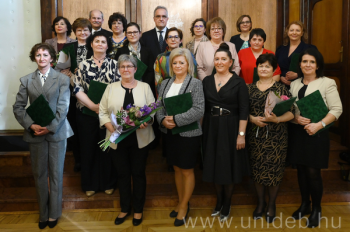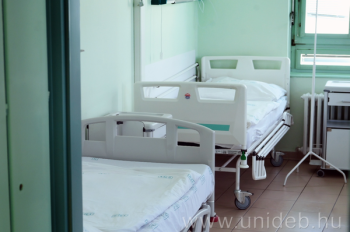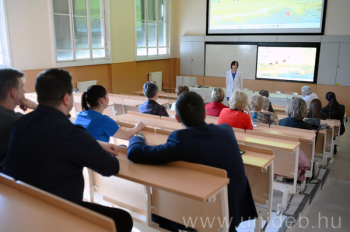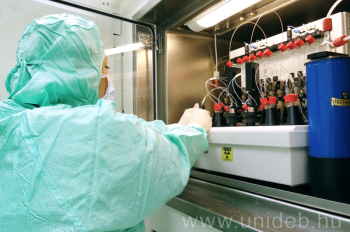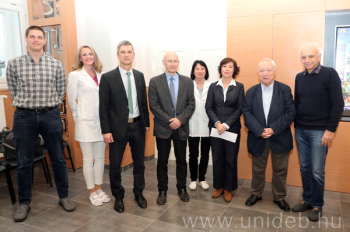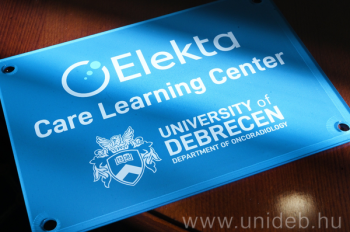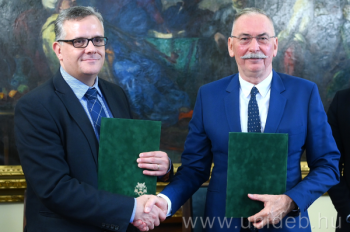The catheter aortic valve implantation performed at the Department of Cardiology and Cardiac Surgery of the University of Debrecen Clinical Centre was shown live on Wednesday to the participants of an international conference in India. The clinic's staff has a wealth of experience in this field, having performed more than seven hundred such procedures to date. The surgery was carried out in a state-of-the-art hybrid laboratory, built with a budget of around one billion forints.
Hírek Clinical Centre címkével
The new CT scanner, which was inaugurated at the Clinical Center of the University of Debrecen, enables faster examinations and more precise diagnoses for patients. This world-class CT scanner will aid the diagnosis and treatment of cardiology patients, and will assist in cardiac and thoracic surgery, neurology, neurosurgery, and oncological surgery as well. The high-tech equipment was acquired through a unique financing arrangement.
In Hungary, it is only the Clinical Center of the University of Debrecen that can offer a state-funded FotoFinder-assisted examination for the early detection of melanoma. The new imaging device capable of providing such a chance was presented to a professional audience at this year's Regional Dermatology and Allergology Forum. At their two-day meeting, which started on Friday, the attending specialists also discussed the most recently available therapeutic options for allergic and immunological diseases.
Nine health workers of the Clinical Centre of the University of Debrecen were honoured for their high quality and exemplary professional work on Wednesday at a ceremony held on the occasion of the Hungarian Nurses' Day. At the event, in addition to the Outstanding Worker Medal and the Reward Award, Presidential Letters of Commendation and the titles of Chief Clinical Physician were also presented.
A chronic internal medicine ward has been established at the University of Debrecen Clinical Centre on the Gróf Tisza István Campus. The new department provides the highest level of care for chronic internal medicine patients requiring complex, long-term examination and treatment. The twenty-two-bed unit started its operations on 1 February.
In Hungary, around 10,000 new cases of lung cancer are diagnosed every year and around nine thousand people die from the disease, even though there is a good chance of curing lung cancer if it is detected at an early stage. The latest research findings and state-of-the-art treatment options for lung cancer were discussed at a professional symposium held on Monday at the Pulmonology Clinic of the University of Debrecen Clinical Centre in connection with World Cancer Day.
PET (Positron Emission Tomography) scans with radioactively labeled glucose are essential in the diagnosis of patients with tumors and in the exact determination of their therapy. The first PET examination in Hungary was conducted in Debrecen in 1994. Since then, the University of Debrecen has played an important part in launching all PET testing sites in our country, either by transferring knowledge or by providing human resources.
Doctors and specialists from Slovakia recently visited the Burns Department of the Dermatology Clinic of the University of Debrecen Clinical Centre. The Hungarian and Slovakian specialists presented the latest technologies and surgical techniques they use and shared their experience and expertise in daily patient care.
The Oncoradiological Clinic of the University of Debrecen has been awarded the title Elekta Qualified Regional Training Centre. This means that, from next year, the clinic will offer theoretical and practical training programs for oncoradiology specialists from Central and Eastern Europe. The relevant cooperation agreement was signed by the representatives of our institution and those of the company Elekta on Wednesday at the University of Debrecen.
The research and development collaboration continues between the University of Debrecen and GE HealthCare, one of the world’s leading medtech companies, to support radiation therapy treatments. As part of this cooperation, the Oncoradiology Clinic participates in the software validation program of GE HealthCare. The agreement regarding the cooperation on the complex radiation treatment system application was finalized on Wednesday.
